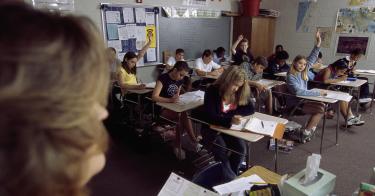Pickens County, S.C., is home to the college football powerhouse Clemson University. Any headlines about this county, all 512-square miles of it, usually involve the Tigers. But like so many other small hamlets across the U.S., critical race theorists have dragged Pickens’ K-12 school system into the spotlight.
In April, Pickens Middle School officials sent a letter to school parents saying that children would be segregated by race for lunch on April 15th. The racial segregation would be part of a program to help students “cope with being a student in a predominantly white school,” according to the message school leaders sent to parents.
Critical race theorists are making their message that everything in public and private life represents a racial power struggle ubiquitous in K-12 institutions. As I explain in my book, Splintered: Critical Race Theory and the Progressive War on Truth, parents around the country are reporting similar racially-focused lessons and school programs in their schools.
For example, Scarlett Johnson describes her town in Wisconsin’s Mequon-Thiensville School District as “quiet, friendly, nice.” But then she began noticing lesson plans and other activities that did not focus on skills and facts but on personal “identity” and claims that America is systemically oppressive. Much of the material was “focused on making kids social justice warriors,” Scarlett says.
Scarlett launched a campaign to recall her district’s school board members. Shortly after the campaign launched, she found herself the object of a New York Times’ feature claiming “Republicans are using fears of critical race theory to drive school board recalls.”
>>> A Critical Look at Critical Race Theory in America’s Classrooms
Really? In a survey of the literature describing the ways in which critical race theory is used in K-12 schools, two University of Utah professors who promote the theory wrote in 2015:
Within the span of the last two decades, critical race theory (CRT) has become an increasingly permanent fixture in the toolkit of education researchers seeking to critically examine educational opportunities, school climate, representation, and pedagogy, to name a few.
The professors then added, “CRT has evolved into a type of revolutionary project.... [W]e owe it to ourselves, and others, to help safeguard CRT.”
By the theorists’ own admission, then, parents are not just imagining that critical race theory haunts school lessons. In response, parents such as Scarlett are leading school board recall efforts to protect children from discrimination. Advocacy groups such as Parents Defending Education are reporting activities such as those at Pickens Middle School to the Office of Civil Rights at the U.S. Department of Education and filing lawsuits arguing that districts such as Pickens are violating the Civil Rights Act.
Meanwhile, state lawmakers are introducing proposals that say no teacher or student should be compelled to affirm or believe any idea, but especially not ideas that violate federal or state civil rights laws.
Before dismissing such proposals as attempts to prevent white students from feeling “discomfort,” parents, taxpayers and members of the media should look closer at what critical race theorists are claiming—and what the theory inevitably causes: Discrimination. Those who claim parents are simply creating things to be afraid of should be ashamed that any child would face bias and prejudice, in school or out of school.
This piece originally appeared in The Chalkboard Review




